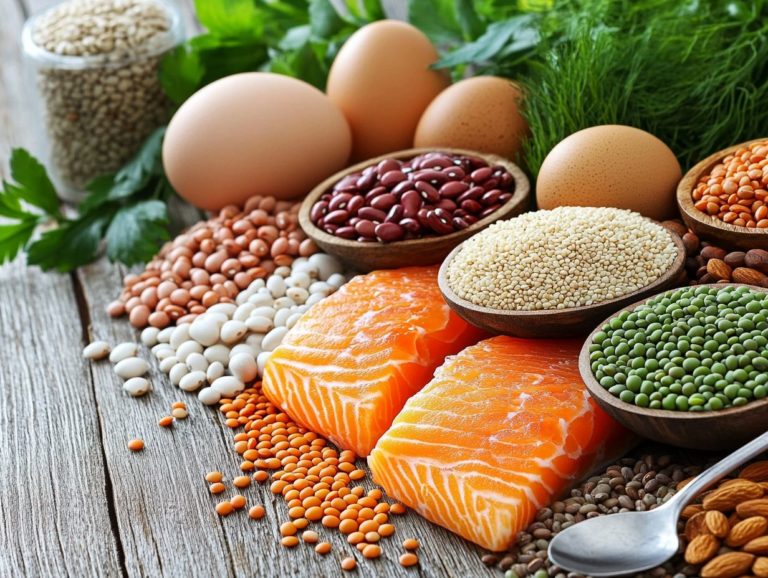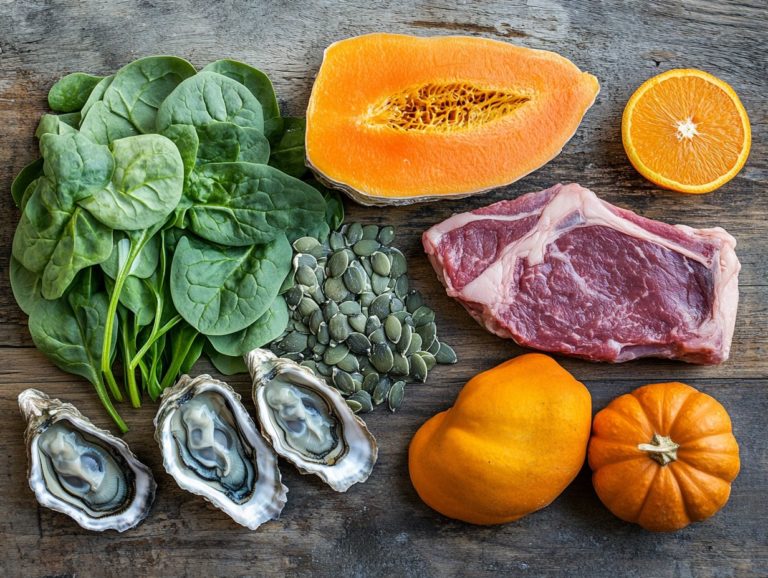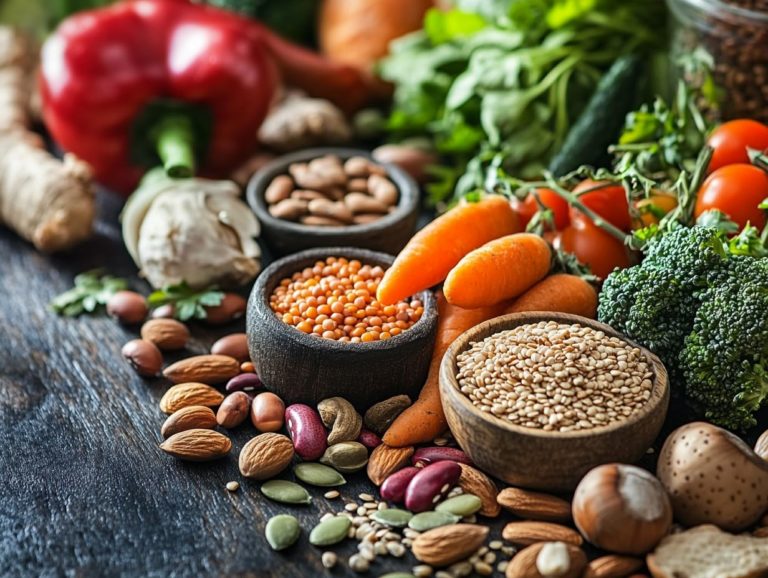5 Best Food Sources for Folate and Folic Acid
Folate and folic acid are essential players in your health, particularly when it comes to cell production and your overall well-being.
This article dives into five of the best food sources full of these vital nutrients think dark leafy greens, legumes, avocados, citrus fruits, and fortified grains.
It clarifies the distinctions between folate and folic acid, outlines the recommended daily intakes, and discusses the health benefits alongside the potential risks of deficiencies.
You ll also find handy tips on seamlessly incorporating these nutrient-rich foods into your diet. Prepare to elevate your health with some delicious and nutritious additions to your meals!
Contents
- Key Takeaways:
- 1. Dark Leafy Greens
- 2. Legumes and Beans
- 3. Avocado
- 4. Citrus Fruits
- 5. Fortified Grains and Cereals
- What Is Folate and Why Is It Important?
- Frequently Asked Questions
- What Are the Top 5 Best Food Sources for Folate and Folic Acid?
- How much folate and folic acid should I consume daily?
- Why is folate and folic acid important for our health?
- Can I get enough folate and folic acid from supplements alone?
- Are there any risks associated with consuming too much folate and folic acid?
- What are some easy ways to incorporate these foods into my diet?
Key Takeaways:
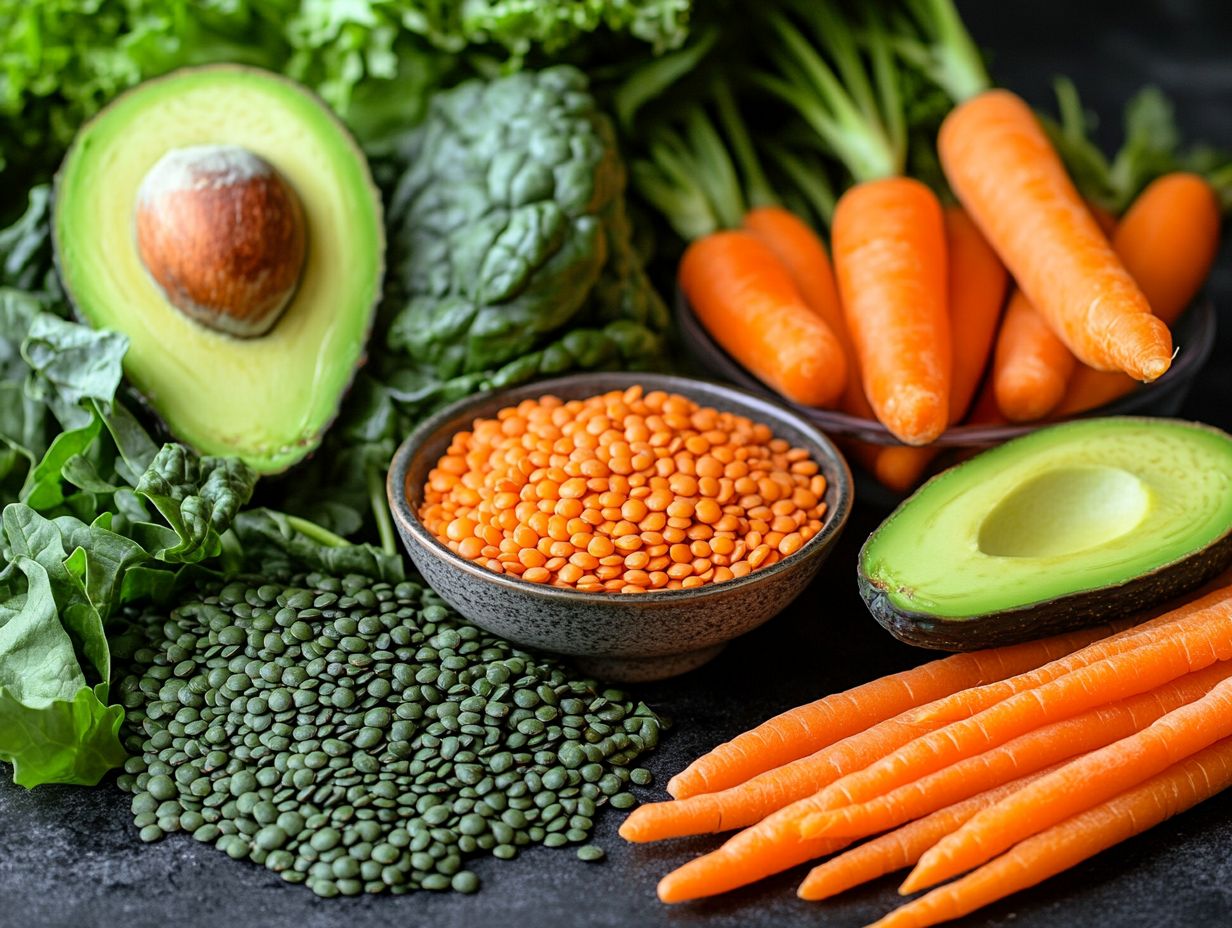
Dark leafy greens are a top source of folate and folic acid, essential for cell growth and DNA production.
Legumes and beans provide protein and high levels of folate, promoting heart health and preventing birth defects.
Avocados are delicious and nutrient-dense, supporting brain function and the formation of red blood cells.
1. Dark Leafy Greens
Dark leafy greens like spinach, kale, and romaine lettuce are your allies for good health. They are rich in folate, which helps keep your red blood cells healthy.
These greens add color to your plate and boost your daily folate intake, which is great for heart health.
Spinach is high in folate, making it an excellent choice for preventing anemia or complications during pregnancy. Kale is packed with antioxidants, which further support your health.
For expectant mothers, these greens are crucial for fetal development and can help lower the risk of defects.
A colorful plate of dark leafy greens not only nourishes your body but also keeps your folate levels in check!
2. Legumes and Beans
Legumes and beans, such as lentils, chickpeas, and black beans, are incredibly nutrient-dense foods packed with folate. Folate is a key player in protein metabolism and is essential for the synthesis of genetic material in our cells.
These versatile ingredients are vital for fulfilling your daily micronutrient needs, making them a superb addition to your diet.
With their rich complex carbohydrates and low-fat content, legumes promote overall health and help lower homocysteine levels in the blood an amino acid linked to cardiovascular concerns.
Incorporating legumes into your daily meals is effortless. Toss them into salads, blend them into smoothies, or enjoy them in hearty soups and stews. You can savor delicious dishes while boosting your nutritional intake, enhancing both your physical and mental well-being.
3. Avocado
Avocado is an incredibly versatile fruit, full of healthy fats and folate, making it a stellar choice for enhancing nutrient absorption and supporting various bodily functions.
This creamy delight is not just a delicious addition to your meals; it also plays a pivotal role in promoting heart health thanks to its heart-healthy monounsaturated fats.
The abundant folate content in avocados is especially advantageous for anyone looking to boost their overall well-being. Folate is crucial for the production of healthy red blood cells and is particularly vital during pregnancy, as it supports fetal development and minimizes the risk of neural tube defects.
By incorporating avocados into your diet, you can elevate your nutrition and make a significant contribution to maintaining optimal health.
4. Citrus Fruits
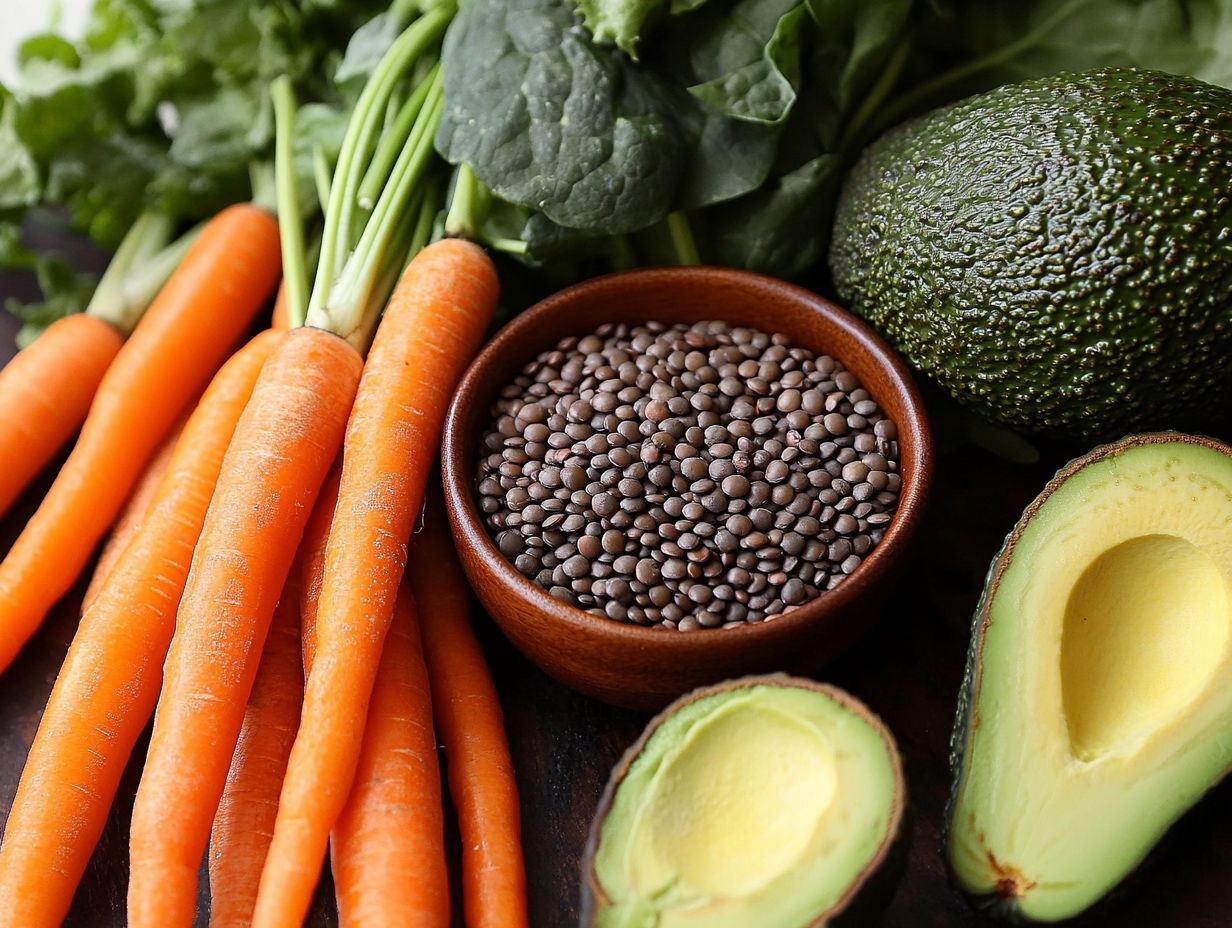
Citrus fruits like oranges, grapefruits, and lemons are vibrant dietary powerhouses. They are packed with folate and vitamin C two essentials that boost your immune system and overall health.
These fruits help you maintain optimal folate levels, which is crucial for DNA synthesis and tissue growth. They also provide a refreshing way to meet your daily nutrient needs.
For example, oranges are particularly high in folate. This makes them fantastic for brain health and fetal development during pregnancy.
Vitamin C also helps improve iron absorption from plant-based foods. This amplifies the benefits of citrus fruits, especially for those working to maintain healthy red blood cells.
The combination of these nutrients promotes cardiovascular health and boosts your energy levels. Ensuring your body operates at its peak is essential!
5. Fortified Grains and Cereals
Fortified grains and cereals are vital sources of folic acid, the synthetic form of folate. This nutrient is often added to foods to help prevent serious birth defects and support proper fetal development during pregnancy.
The U.S. Food and Drug Administration sets guidelines for food fortification. These regulations ensure enriched foods are safe to eat and provide the nutrients needed to address common deficiencies.
By including essential nutrients like folic acid in popular breakfast cereals, these foods help you meet your daily folate needs easily. This is especially important for women of childbearing age, as adequate folate levels can significantly improve pregnancy outcomes.
What Is Folate and Why Is It Important?
Folate, or vitamin B9, is a water-soluble vitamin that is crucial for many bodily functions. It helps with DNA synthesis, protein metabolism, and producing healthy red blood cells.
Getting enough folate is important to prevent health risks like megaloblastic anemia and serious birth problems. During pregnancy, it plays an even bigger role in reducing the risk of defects like spina bifida and anencephaly.
Experts recommend that women of childbearing age consume at least 400 micrograms of folate daily. This is crucial for their health and for preparing their bodies for potential pregnancy.
Leafy greens, legumes, and fortified cereals are excellent sources to meet your folate needs easily, especially when considering the top food sources of folate for pregnant women!
What Is the Difference Between Folate and Folic Acid?
Folate and folic acid differ in form: folate is natural and found in food, while folic acid is synthetic and often found in supplements. Your body absorbs folic acid more easily.
Folic acid is more efficiently absorbed in the intestines. In contrast, natural folate requires additional processing in the liver before your body can use it. This affects your dietary choices.
Choosing foods rich in natural folate, like leafy greens, legumes, and citrus fruits, gives you a full range of nutrients. These foods lower the risk of chronic diseases and provide fiber and antioxidants, making them a better choice than supplements for a balanced diet.
What Are the Recommended Daily Intakes for Folate and Folic Acid?
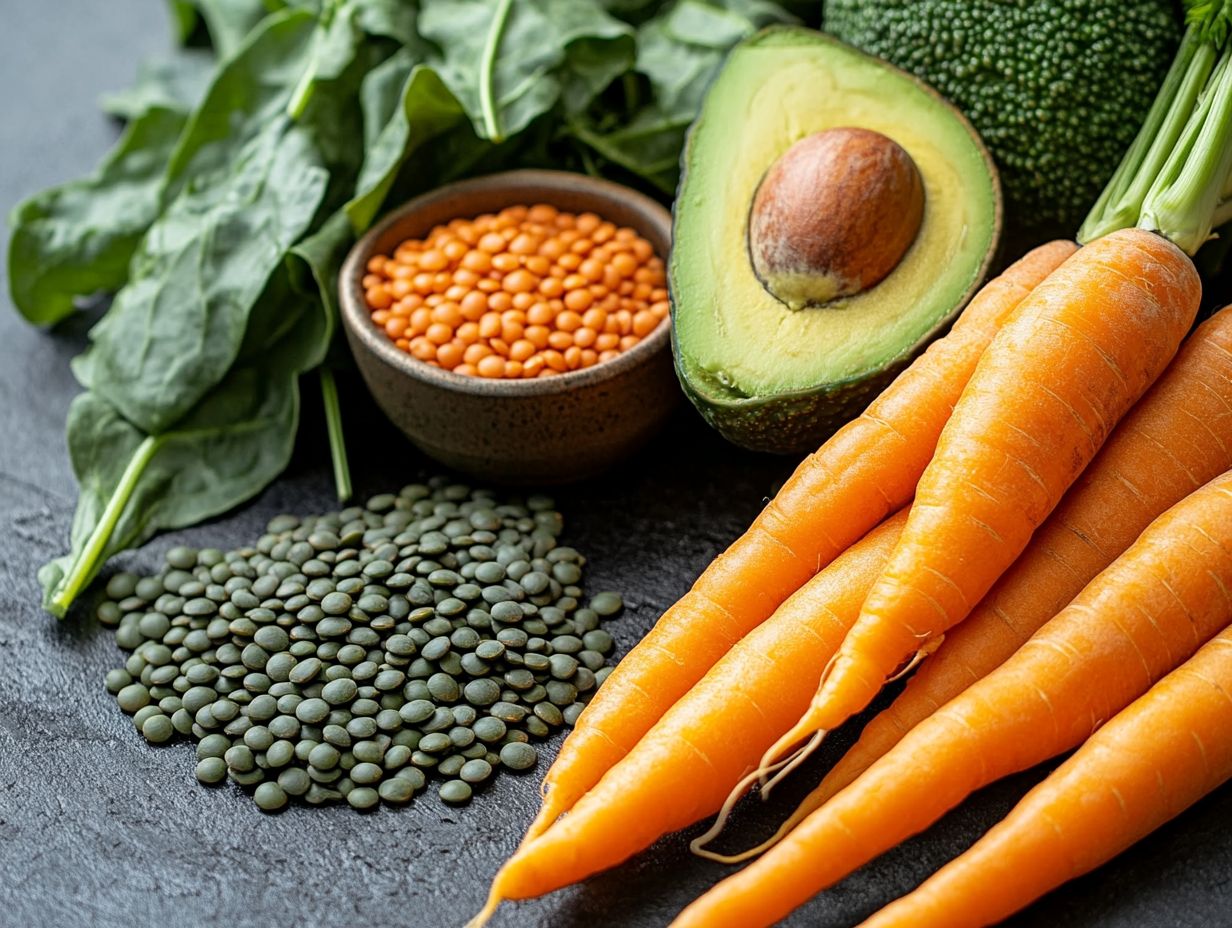
The recommended daily intake for folate varies based on age and gender. Pregnant individuals have heightened requirements to support critical growth and development.
For pregnant individuals, the intake is typically set at 600 micrograms. For children, the recommended dietary allowance is lower, generally ranging from 150 to 300 micrograms depending on their age.
As for adults, the guideline is around 400 micrograms daily to maintain optimal health. It’s especially important for women of childbearing age to ensure they have adequate folate levels. Sufficient intake before and during early pregnancy is linked to a reduced risk of neural tube defects in developing babies.
Lactating mothers have slightly elevated needs, set at 500 micrograms, to support their health and that of their newborns. Understanding these varying requirements is crucial for every demographic to promote healthy growth and development.
What Are the Health Benefits of Folate and Folic Acid?
Folate and folic acid present a wealth of health benefits you must not miss out on! They can lower your risk of cardiovascular disease, enhance cellular function, and even reduce the likelihood of cancer by inhibiting the growth of cancer cells.
Maintaining adequate folate intake is crucial for reducing homocysteine levels, significantly lowering your risk of heart-related issues. This vitamin is essential for brain health, playing a vital role in cognitive function and potentially delaying the onset of diseases that affect brain health over time, like Alzheimer s.
Research indicates that folate may help you maintain mental clarity and decrease memory decline as you age. Sufficient folate intake supports neurotransmitter synthesis and promotes overall brain cell health, fostering a sense of well-being and mental sharpness. It is a fundamental component of your balanced diet.
How Can a Deficiency in Folate and Folic Acid Affect the Body?
A deficiency in folate can pose serious health risks, including a condition where your body makes large, unhealthy red blood cells, known as megaloblastic anemia. This condition also increases the likelihood of neural tube defects in developing fetuses, making folate’s role particularly critical for expectant mothers.
If you’re lacking this essential B vitamin, you might notice symptoms such as fatigue, irritability, and gastrointestinal issues. This is largely due to folate’s vital involvement in DNA synthesis and repair.
Furthermore, insufficient levels of folate can lead to elevated homocysteine levels in your bloodstream, raising your risk for cardiovascular problems. This concern is heightened for certain groups, like pregnant women who need adequate folate for fetal development. Individuals grappling with alcohol consumption should also be aware, as alcohol can hinder folate absorption and metabolism.
Taking proactive steps to ensure you’re getting enough folate is essential for mitigating these potential health consequences.
How Can One Incorporate These Foods into Their Diet?
Incorporating folate-rich foods into your diet is essential for achieving optimal levels of this vital nutrient. It’s quite straightforward through thoughtful meal planning that includes a variety of dietary sources like dark leafy greens, legumes, and fortified grains.
Consider crafting weekly menus that showcase delightful dishes such as:
- Spinach salads
- Lentil soups
- Quinoa bowls
It’s also crucial to pay attention to how you prepare these foods; steaming vegetables is a fantastic way to retain their folate content compared to boiling.
If you find it challenging to meet your folate needs through food alone, supplementation can be a valuable alternative. Just be sure to consult a healthcare provider to determine the appropriate dosages.
Meal ideas like chickpea stir-fry or avocado toast on whole grain bread offer delicious ways to boost your folate intake throughout the day.
Frequently Asked Questions
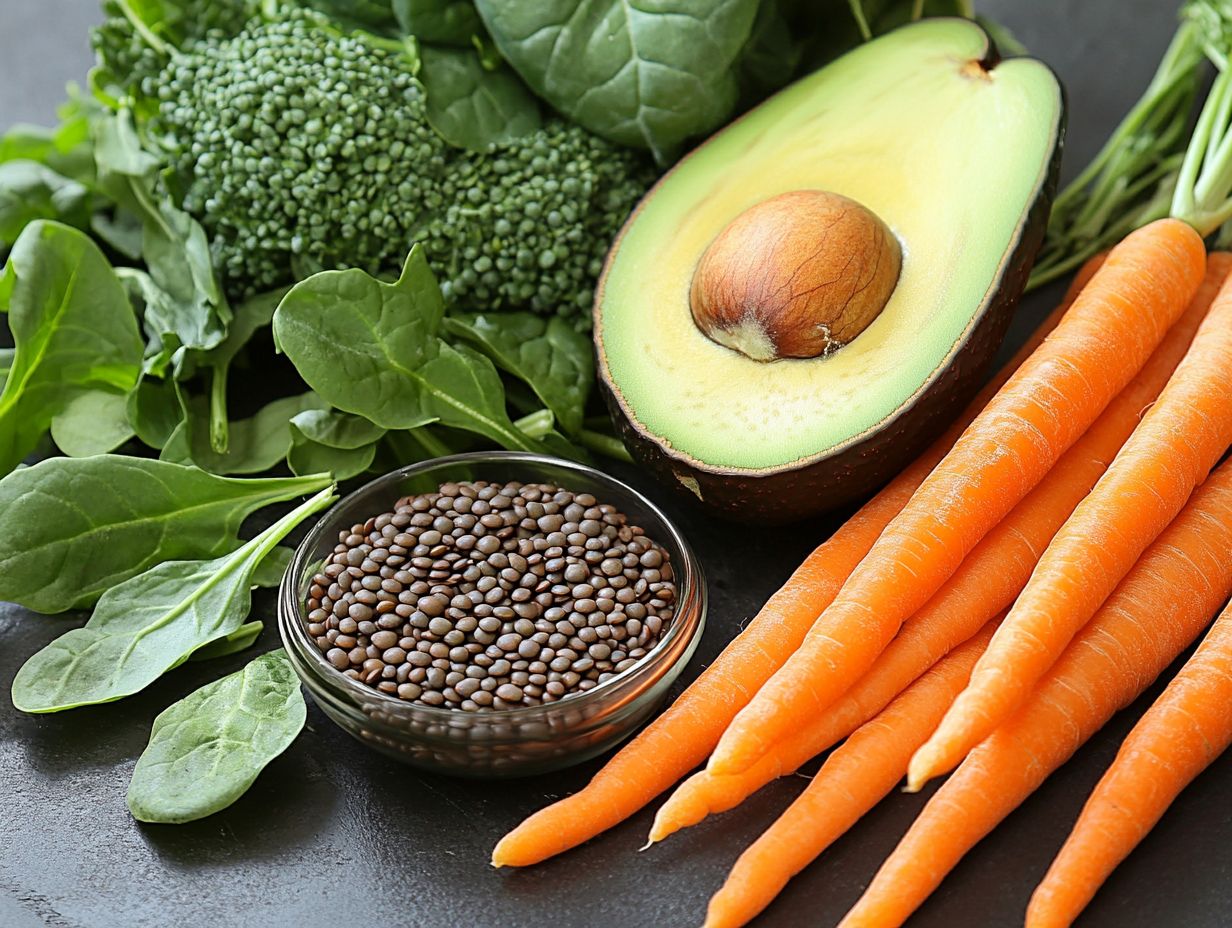
What Are the Top 5 Best Food Sources for Folate and Folic Acid?
- Leafy green vegetables
- Beans and legumes
- Fortified cereals and grains
- Citrus fruits
- Avocados
In conclusion, ensuring you get enough folate is crucial for maintaining overall health. Make it a priority to include these foods in your meals!
How much folate and folic acid should I consume daily?
The recommended daily intake of folate and folic acid varies depending on age and gender. For adults, the recommended intake is 400 micrograms per day.
Why is folate and folic acid important for our health?
Folate and folic acid are vital for our health. They help produce red blood cells, synthesize DNA, and support cell growth and repair.
These nutrients are also crucial for brain function and development.
Can I get enough folate and folic acid from supplements alone?
Supplements offer a convenient way to meet your daily needs for folate and folic acid. However, it’s best to get these nutrients from whole foods, as they are more easily absorbed in their natural form.
Are there any risks associated with consuming too much folate and folic acid?
Getting too much folate and folic acid from foods is usually safe. But high doses from supplements can cause side effects like nausea and abdominal cramps.
What are some easy ways to incorporate these foods into my diet?
Excited to boost your folate intake? Here are easy ways to add these foods to your meals!
Add leafy greens to smoothies or include beans and legumes in salads.
Snack on citrus fruits or top your toast with avocado. Choose fortified breakfast cereals for a quick meal.

